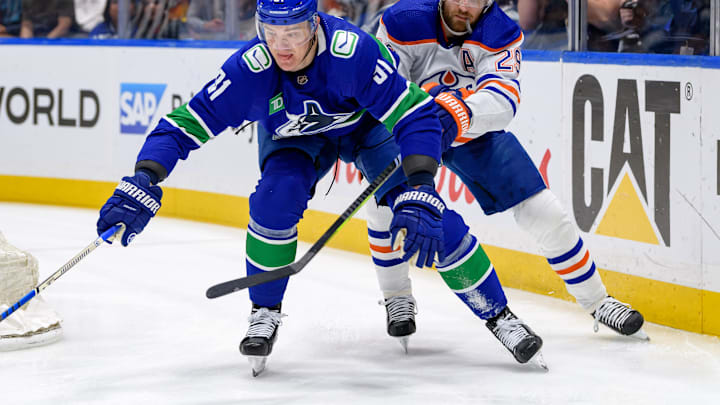Had you told an optimistic Vancouver Canucks fan prior to this season that they’d get as far as they did, you might have gotten a somewhat surprised — but ultimately warm — reception. Had you told the same thing to, say, an Edmonton Oilers fan — or worse, a member of Canucks media — you would have been ridiculed to the point where you’d have to cut your hair, change your name and flee the country.
You know who called it before the season even began, though? Leon Draisaitl.
“They have everything you need, essentially, to be a successful team,” he saidto Sportsnet’s 32 Thoughts crew in September.
Draisaitl’s words proved prophetic. The Canucks would beat his Oilers 8-1 in the season opener and three more times in the regular season, before losing to them by a goal in Game Seven of the second round of the playoffs.
But what exactly went well? Why were the Canucks in the Connor Bedard conversation last year and the Stanley Cup conversation this year? Let’s break it down.
1) Stars Being Stars
When you have six players, a coach and a P.A. announcer at the All-Star game, you know things are going well. Nobody that watches the Western Conference was surprised to see Quinn Hughes, JT Miller, Elias Pettersson or Thatcher Demko perform like franchise players, but to have that many guys have career years at the same time like that is unusual.
Brock Boeser, on the other hand, surprised everyone. He could have hit the 30-goal mark — the one that had alluded him his whole career — with one hand tied behind his back. Perhaps time helped to heal the wound left by his father’s passing two years ago this week, or maybe a four-goal performance in the season opener just put him on a good track. At any rate, anyone with a heart was glad to see him doing well after struggling for so long.
A 1st period hat-trick and natural hat-trick is about as rare as it gets. Brock Boeser makes history with that performance. Incredible. 🎩 🎩 🎩 #Canucks pic.twitter.com/PqeQKmhYCj
— Grady Sas (@GradySas) May 13, 2024
Other honourable mentions go to Elias Lindholm for making the All-Star game and Filip Hronek for crushing it the majority of the regular season. (Editor's note - Hronek's dip in form has been attributed to an arm injury, even though he denied as such as his end of season presser.)
2) Depth Domination
Unlike the NBA, you can’t win in the NHL with just stars. Ask the Toronto Maple Leafs. Equally as important to the Canucks’ success were their depth players.
Unfortunately, Conor Garland shut down the attempt to name the league’s most dominant third line, but with or without a name, it contributed to just as many wins as the Lotto Line. On nights where the top guys just couldn’t seem to generate any offense, Garland, along with Dakota Joshua and Teddy Bleuger, would pick up the slack.
After five years of the “Chaos Giraffe,” Tyler Myers finally became the responsible veteran defenceman the Canucks thought they were getting when they signed him. Additionally, guys like Ian Cole (before the Edmonton playoff series), Noah Juulsen and Carson Soucy provided the stability that the team needed.
Nils Höglander took a massive step in his development this year, contributing up and down the lineup. Pius Suter and Sam Lafferty did the same, chipping in key goals when needed.
And where would the Canucks be without their goaltending depth? Arturs Silovs is the obvious story with everything he did in the playoffs, but Casey DeSmith also played a key role as he allowed Demko to rest as much as he needed.
